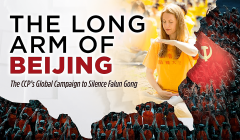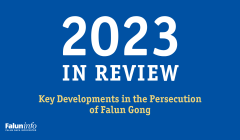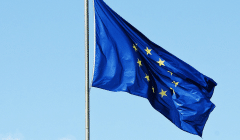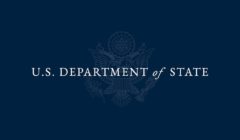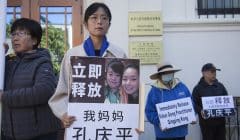Student Organizations or Government Front?
Capitol Hill forum probes motives, conduct of PRC-backed Chinese student clubs
NEW YORK – Recent months have witnessed increasing belligerence across the United States by Chinese student groups, expressed in particular as hostility and harassment, or even threats of violence, toward students who practice Falun Gong, according to speakers at a Friday afternoon forum held at the Rayburn House Office Building on Capitol Hill. The panel was organized by Washington Forum.
Ten speakers, many of them former Chinese student group leaders themselves, described how clubs around the world serve as front organizations for communist China’s diplomatic missions. These university organizations are financially supported by Chinese embassies and consulates, plan their activities according to orders from PRC diplomats, and provide Beijing with intelligence reports, panelists said.
Dr. Tony Liu, who recently completed a term as a post-doctorate researcher at the University of Chicago, spoke of how, before students go abroad to study, Chinese state security organs recruit them to carry out espionage work. Before they reach America’s shores, many are effectively recruited, or at least briefed, on how to “behave” once overseas. Other panelists said Chinese student organizations are used as a training ground for the Communist Party’s espionage work.
Another speaker, Xia Yiyang, senior researcher for the World Organization to Investigate the Persecution of Falun Gong (WOIPFG), introduced a new report by his organization on this topic (report). Xia said that, according to the U.S. Foreign Agents Registration Act, these Chinese students are in violation of U.S. law and in danger of being expelled. The organization’s findings show that CSSA leaders are on the payrolls of Chinese embassies and consulates and provide intelligence to them, acting as de facto spies while obtaining prestigious U.S. degrees.
One recent incident highlighted at the forum took place at Columbia University in New York. On April 20, the university’s Amnesty International chapter and Falun Dafa Club organized a panel discussion on illicit organ “harvesting” from Falun Gong prisoners of conscience in China (report). David Matas, a human rights attorney and co-author of a prominent report on the subject, was the main speaker, joined by two Chinese doctors.
According to Lidia Louk, organizer of the Columbia event and a speaker on Friday, on the eve of the panel discussion Columbia’s Chinese Students and Scholars Association (CUCSSA)—an international organization said by many to be a PRC false-front entity—electronically circulated a virtual call to arms. It declared that the group would, “use the sea of flags, dyed with blood, to strike hard against the [group’s] arrogant fervor, and to resolutely defend the honor and dignity of the Motherland!” The prospect of “inevitable” physical confrontation was raised.
CUCSSA indeed attempted to disrupt the event, and brandished dozens of discriminatory signs denouncing the Falun Gong, though the practice of Falun Gong was not the topic of the event, and afterwards posted an acerbic “report” on its website. The group, which boasts two Chinese consulate officials as advisors, gloated that it had “exhibited its formidable cohesive force and combat effectiveness,” and had “sent a vivid warning to other organizations” that holding similar activities would “only accelerate one’s self-destruction!”
CUCSSA’s post went so far as to declare that its members “share bitter hatred of the enemy”—referring to classmates who are part of the campus’s Falun Dafa club. The one-page item managed to call the Columbia club “evil” seventeen times. Since the April event, the CUCSSA posted on its website nine more articles demonizing Falun Gong, all taken verbatim from the Chinese embassy’s website. CUCSSA’s president, Xu Kai, admitted the latter fact to WOIPFG investigators.
Some 109 similar associations exist across the United States, and hundreds more operate in over a dozen countries worldwide. All of them, according to one former Chinese diplomat, act at Beijing’s behest.
“Often, it’s not convenient for the Chinese [consulates and embassies] to do certain things. So to use student organizations, with a neutral name, is more effective,” says Chen Yonglin, who served as the Consul for Political Affairs at Sydney’s Chinese consulate before defecting to Australia in 2005. “Such groups are in fact controlled by the Chinese mission and are an extension of the Chinese communist regime overseas.”
Many Chinese student and scholar associations are open about their links to China’s regime. At England’s Sunderland University, for instance, a CSSA bylaw states: “Our association is under leadership and guidance of Chinese Embassy.” In Ireland, the embassy’s own Tang Jiwei is simply listed as the official contact for the “student” association. Membership meeting duties in Germany’s CSSA-Wuerzburg include “passing on and discussing how to carry out the orders from the Chinese Embassy and the Ministry of Education of China.”
One Friday speaker, a former president of Catholic University of America’s CSSA chapter, Li Jingning, spoke of how at a closed-door meeting then-Chinese-Ambassador Li Zhaoxing directed organization leaders to attack Falun Gong. Drexel University professor Frank Tian Xie spoke of how overseas Chinese student organizations have been run by the Communist Party since as early as the 1989 student democracy movement, at which time Xie served as a CSSA vice president. Democracy activist Tang Baiqiao said at the event that such collaboration, though only recently coming to light, goes back even further.
Chinese student actions against Falun Gong clubs fit a larger pattern of PRC-orchestrated aggression around the world against the Falun Gong. So prominent have PRC-led acts of harassment, intimidation, and discrimination grown that in 2004 the United States Congress passed House Concurrent Resolution 304, calling on the U.S. President to formally protest, the Attorney General to investigate, and PRC officials to immediately stop interfering with U.S. freedoms or face possible legal repercussions.
“Perhaps it is because HConRes 304’s recommendations have not been implemented that we are here discussing this today,” said the Rayburn event’s moderator, Leeshai Lemish. “These CSSAs are not like other student clubs. Imagine a German student association at, say, Columbia University in the 1930s barring Jews from its activities and reporting back to the German consulate on what progress it’s making with its anti-Semitic work in New York. That’s the parallel.”


